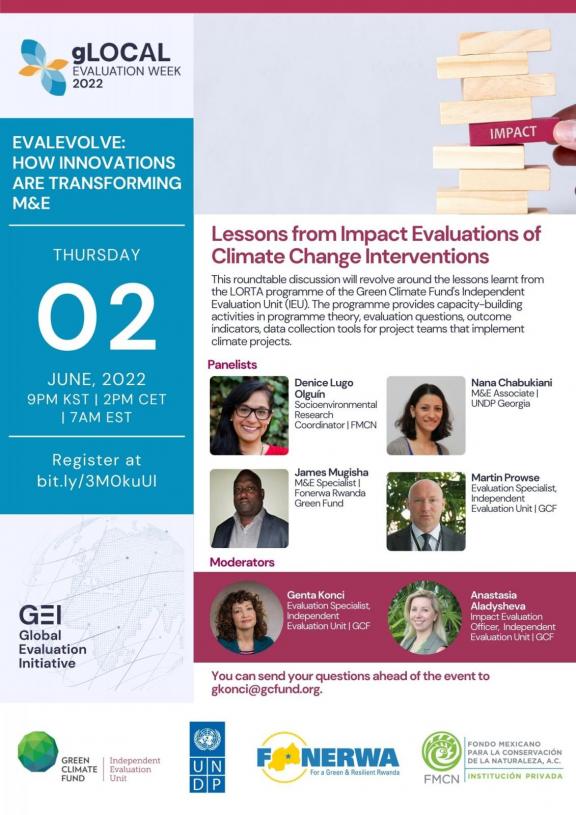IEU at gLOCAL Evaluation Week 2022
Online
2 June 2022
On Thursday, 2 June, the Independent Evaluation Unit (IEU) of the Green Climate Fund (GCF) organized a roundtable discussion titled “Lessons from impact evaluations of climate change interventions” as part of the Global Evaluation Initiative’s 2022 gLOCAL Evaluation Week. The event focused on the IEU’s Learning-Oriented Real-Time Impact Assessment (LORTA) programme, highlighting the experience of three LORTA-participating impact evaluation teams. The event was attended by over 30 practitioners from multi-lateral development institutions, academia, government, and the private sector.
The event’s panel discussion explored common challenges that evaluators face when conducting impact assessments of climate change interventions. These included accounting for non-linear impacts, accurately assessing short- and long-term impacts, contending with ambiguous concepts such as “resilience,” sampling interview respondents, and more. Please see below a few key take-takeaways from the event.
- Short assessment periods might lead to inaccurate assessments of an intervention’s impact, this being particularly relevant to evaluations of carbon sinks in forestry and agroforestry projects. Delays in the implementation of projects caused by the COVID-19 pandemic, among other factors, might exacerbate this issue. To measure short-term impacts, Dr. Prowse suggested including indicators for intermediate outcomes related to changes in attitude and behaviour which can act as short-term indicators of the uptake and use of a particular intervention. For long-term impacts, building and maintaining robust panel data can lay a good foundation for project teams to estimate causal impacts over time, including beyond the duration of a specific GCF project.
- A related issue was raised about the non-linearity of impacts. Dr. Aladysheva underlined the importance of integrating expectations of non-linear impacts when mapping out the intervention’s Theory of Change.
- Another theme raised was the use of debated concepts such as “resilience". Mr. Mugisha and Ms. Lugo both chose to substitute the concept of “resilience” with “adaptive capacity” to circumvent the issues around their definition and allow for more relevant measurements. Additionally, Mr. Mugisha highlighted the need to use proxies to account for such concepts, including upward economic mobility.
- The participants also discussed the relevance and importance of using spatial data in impact evaluations, including the possibility of accessing long-term impacts via remote spatial data.
Further information on the projects presented can be found through the following links:
